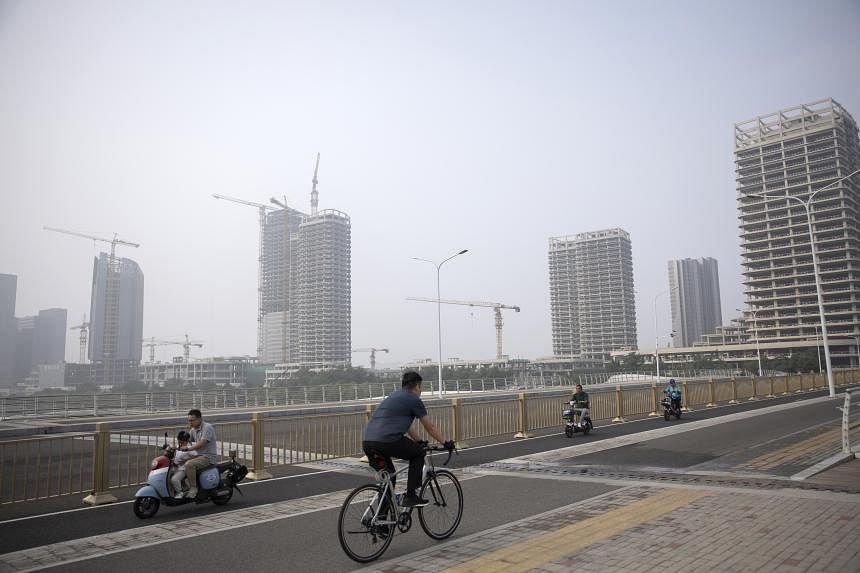SINGAPORE – The source of the money is shrouded in mystery. But a major Chinese real estate developer appears to be trying a novel approach to resolving its debt: it is working with a buyer to purchase bonds at deeply discounted prices, and then cancelling the securities.
The moves by China Fortune Land Development (CFLD), whose default in 2021 marked the beginning of the country’s property crisis, are the latest twist in a debt debacle that has left more than US$140 billion (S$188 billion) of real estate bonds in default and become a massive drag on the world’s second-largest economy.
While some details of China Fortune Land’s approach are murky, bond investors with knowledge of the purchase arrangements say they could offer a road map for dozens of troubled real estate companies that are struggling to pay creditors – even after restructuring their debt.
The developer is attempting to eliminate some of its bonds cheaply, and outside of its restructuring agreements, via private contracts with bondholders and a third party. Some investors are willing to accept big reductions from the bonds’ principal value – known as “haircuts” – and recover a small amount of cash in the near term, rather than wait for years for larger payouts that may not materialise if the property downturn worsens.
Chinese real estate companies have defaulted on more than US$123 billion in international bonds and 148 billion yuan (S$27.4 billion) in onshore bonds since 2020, according to data compiled by Bloomberg. At least another US$59 billion of Chinese developer debt are trading at distressed levels.
Many developers have gotten bondholders’ support to extend debt maturities or change their payment terms, but weak residential property sales and falling home prices have made it difficult for the companies to come up with enough cash to compensate investors.
The offshore bonds of some defaulted developers, including China Fortune Land and China Evergrande Group, recently traded at below 5 cents on the dollar, indicating extremely low recovery prospects for the debt.
Early casualty
China Fortune Land Development was the first major casualty of a central government policy to curtail property developers’ debt levels when it failed to repay one of its dollar bonds more than three years ago. The 26-year-old company, which built housing complexes in smaller Chinese cities and owned commercial properties, also defaulted on its onshore bonds in 2021.
Over the past few months, representatives of CFLD have been in touch with some bondholders to negotiate sales of their holdings to a company called Bazhou Yongsen Real Estate Development, according to people familiar with the matter. The buyer has been paying 10 yuan for every 100 yuan of the bonds’ principal value, the people said, asking not to be identified describing private discussions.
Some investors have agreed to sell their bonds at that price, given the uncertainty over CFLD’s repayment plan.
CFLD representatives told some bondholders that bonds with a total face value of nearly 10 billion yuan have been bought in this manner as of last month, representing more than a quarter of the 37.1 billion yuan of onshore bonds covered by its debt-restructuring plan, according to people familiar with the matter.
The sellers signed a three-party debt-transfer agreement, said the people. The three parties comprise the bondholders, Bazhou Yongsen, and CFLD, according to a copy of the agreement seen by Bloomberg News.
In response to a query, CFLD described the arrangement as a market-based transaction between the buyer and the seller, and that it only assisted and cooperated in a series of transfer procedures as an issuer.
Mysterious buyer
Little is known about Bazhou Yongsen. The company was established in 2016 in Langfang city in Hebei province – the same city where CFLD is based – according to Tianyancha, an online platform that aggregates company registration information. Bazhou Yongsen used to be owned by three individuals who transferred their stakes to another company called Beijing Luhu Technology Group earlier this month.
Some bondholders spoke only with CFLD officials during the negotiation process, and did not meet with or talk to anyone from Bazhou Yongsen, according to the people familiar with the matter. They weren’t told where the money for the bond purchases was coming from. A representative of Bazhou Yongshen declined to comment.
The builder intends to cancel the bonds with a securities clearing house after presenting the agreement to it, the people said. Funds would be transferred to the bondholders before the cancellation, the people added.
CFLD’s financial troubles earlier on helped set off a broader chain reaction across the property sector in China. Its default saddled many large investors – including mutual funds and insurance giant Ping An Insurance (Group) – with heavy losses, and caused other investors to back away from buying property bonds. That led to a credit crunch that made it more difficult for other developers to borrow money, and dozens more subsequently defaulted.
“Asking bondholders to take heavy haircuts appears to be the only practical way for the distressed developers to survive,” said Zerlina Zeng, Head of East Asia Corporates Credit Research at CreditSights. She added that developers may default again post restructuring, unless there is a sustained improvement in their contracted sales and cash collection. BLOOMBERG

